The Art of War Summary
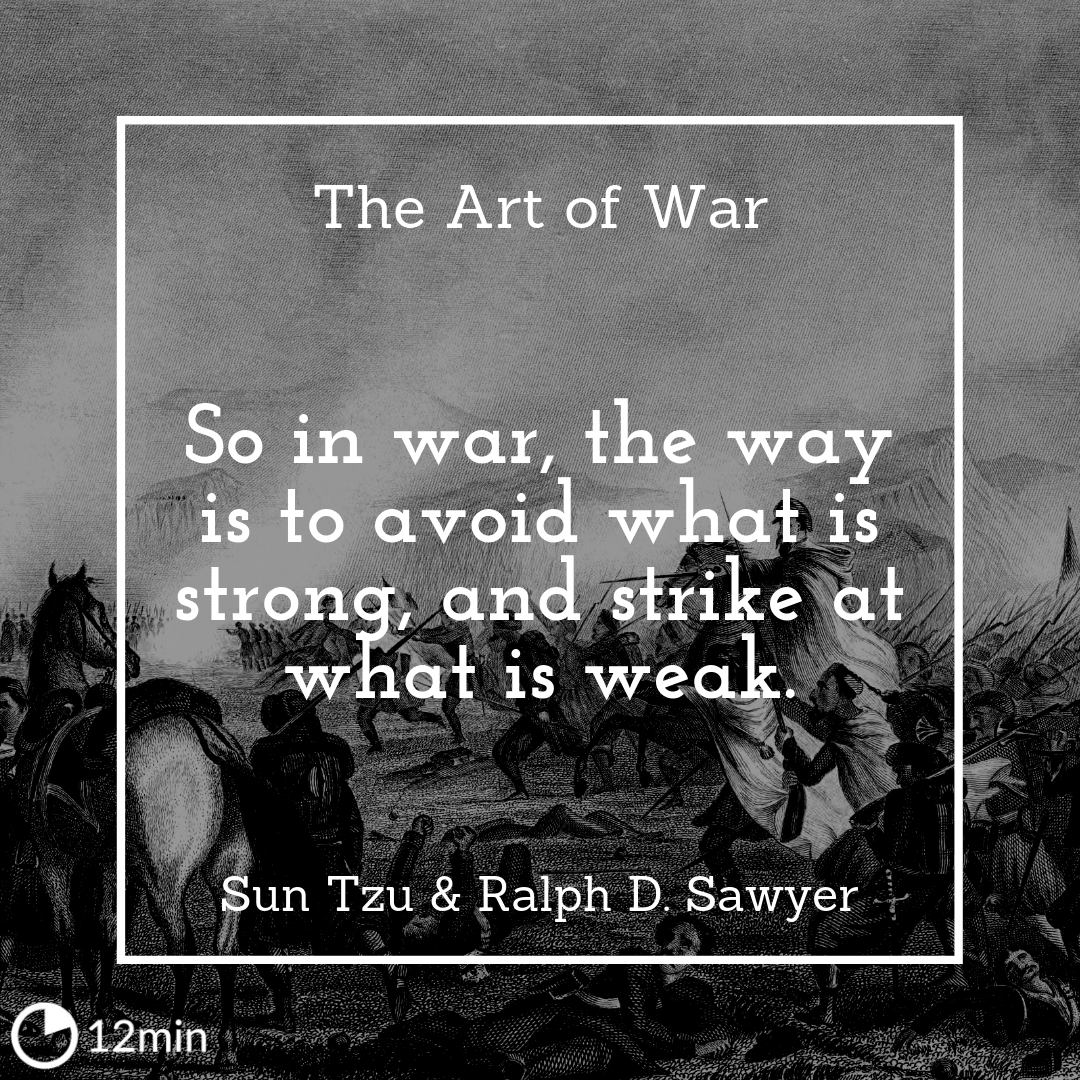
15 min read ⌚
MicroSummary: Written by Sun Tzu, a Chinese military general over 2,500 years ago. OurThe Art of War PDF Summary will help you gain a competitive advantage in all spheres of influence. Originally a military treatise, the lessons propagated by the book have been recognized as practical guidelines by modern businessmen, politicians, and athletes all around the world.
Timeless Strategies for Smartest Battles that Lead You to Victory
After reading it, we discovered impressive ideas and timeless advice in The Art of War written by Sun Tzu.
STRATEGIES / THE ART OF WAR
Disorder came from order, fear came from courage, weakness came from strength.
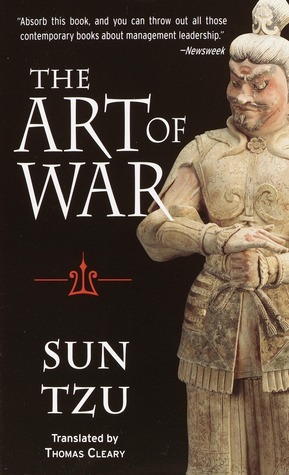
Of course, I heard in many contexts talking about Sun Tzu ’s book – The Art of War. I’m not a big fan of a military field – so definitely this was not my main source of information.
What really surprised me was the fact that I heard or read about it in various contexts. So much different from the military type. The Art of War Summary gives insightful info on the mastery of warfare.
The time for sieges and city defenses is long gone. However totally neglecting the concept of war, shows your illiteracy, because even now, the threat of attack exists.
We think everyone would agree with the theory that today’s battles are fought behind closed curtains.
This book summary offers insights into ancient warfare, and how these tactics can be used in the Digital Age.
Who Should Read “The Art of War”? And Why?
For the majority of times, you cannot just limit a book to a particular qualified audience that can quickly grasp author’s enigmatic style. Once in a while, an easily digestible book is the first choice overshadowing the complex, mind-altering classics.
Why? – Stay with us to find the answer:
It is significant that you have some fundamental understanding of war or at least be passionate about it. However, even these qualifications are not mandatory, but they are necessary so that the author can easily guide the reader throughout the book.
Ralph D. Sawyer with Sun Tzu’s perspective ignites the inner fire from within that encourages students, adults, people in business, from different races-nationalities-religions, to reconsider their approach towards life and implement traditional ancient technique into the digital era.
About Sun Tzu & Ralph D. Sawyer
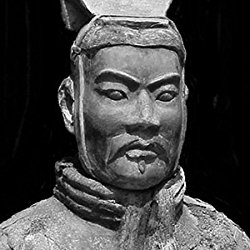 Sun Tzu date of birth varies between 540 and 545 BC and according to numerous historians, he died at the age of 50 around 495 BC.
Sun Tzu date of birth varies between 540 and 545 BC and according to numerous historians, he died at the age of 50 around 495 BC.
As a famous Chinese general, author, war strategist, and philosopher he brought new meaning to the word strategy not just in China but throughout the world.
China’s greatest general is the author and the creator of “The Art of War” a widely prominent masterpiece of military tactics and Warfare that change the course of Eastern and Western War History.

Translator Ralph D. Sawyer is an American historian, an expert in ancient Chinese Warfare and he is one of the eminent scholars of Chinese War Culture.
“The Art of War Summary”
Well-renowned Chinese General Sun-Tzu advises armies, rulers, and other military commanders to spot the perfect opportunity to start strategical combat.
All they need to do is to understand and grab the perfect timing for such an action and back away when such an approach is required.
Here’s the case:
It is kinda funny that even in the 21st century, the concept of war, tactics, and military strategies is present as well. Modern Warfare is composed of an intelligent, strategic, and diplomatic way of thinking in protecting national and corporate interests.
“The Art of War” is a short and intriguing book for all historians and military admirers, it explains the essence of Sun-Tzu’s classic treatise. This book is translated and interpreted by Ralph D. Sawyer who is an expert on ancient and middle ages – Chinese military strategies.
He as an interpreter tries to provide a sufficient amount of materials to put the work in context.
What is the deal with war nowadays?
We are witnessing many classic representatives and contemporary adapters of Sun-Tzu’s work and view, Sawyer distinguishes from them by trying not to copy Sun-Tzu’s words and perspective, and yet learn from him and his ancient and at the same time modern military approach.
Passionate by history? This is the book you should definitely read.
Business. Sports. Philosophy. Economics. Psychology. You’ll find The Art of War useful in various fields.
13 chapters will keep you awake, strongly connected to your full capacity of mind. Developing a sharp attention to everything, but even much more attention to yourself.
We present a brief description to help you have a small preview of what are you going to find in this book.
- Detail Assessment and Planning: Be prepared to deal with five fundamental concepts: the Way, seasons, terrain, leadership, and management.
- Waging War: Decision-making process is a challenging one. So, you have to take into account which will be the costs for engaging in conflict.
- Strategic Attack: is defined by Sun Tzu through five factors that are needed to succeed in any war: Attack, Strategy, Alliances, Army, and Cities.
- Disposition of the Army: This chapter is a lesson about the importance of defending and also about the relevance of recognizing strategic opportunities.

- Forces: Time, creativity and sharp minds. Those are the main tools for leading an army
- Weaknesses and Strengths: Sun Tzu is playing with these two key-concepts in order to underline that there is an extraordinarily powerful tool that may help you turn everything in your favor: seeing the opportunities.
So, relating to the enemy you’ll learn from this book that:
“The opportunity of defeating the enemy is provided by the enemy himself.”
And, relating to your own army, you’ll find out that:
“Disorder came from order, fear came from courage, weakness came from strength.”
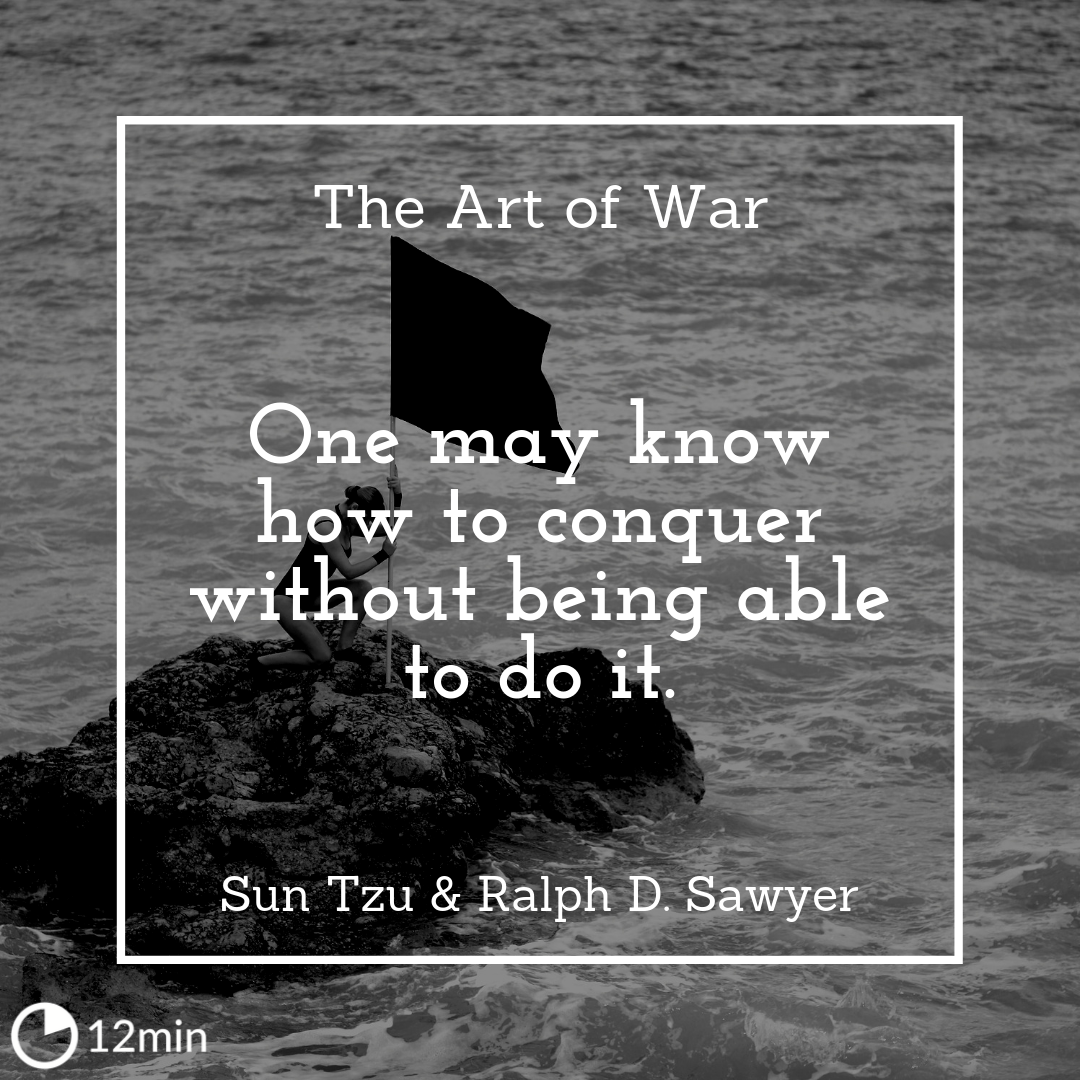
- Military Maneuvers: Which will be the risk of a direct conflict? How can you win this kind of confrontations? The “Military Maneuvers” chapter will provide you with the answers to your questions.
- Variations and Adaptability: A war is full of unexpected. Maybe you cannot anticipate which will be the next move of your enemy. But what you can do is to expect the unexpected and be prepared for it.
“He will win who, prepared himself, waits to take the enemy unprepared.”
- Movement and Development of Troops: focusing on your enemies’ intentions. This should be part of your strategy. Analyze and anticipate will help you understand better the situations you’ll find yourself and to make intelligent moves through new enemy territories.
- Terrain: You’ll find out here which are: the three general areas of resistance (distance, dangers, and barriers) and the six types of ground positions that arise from them.
- The Nine Battlegrounds: In this chapter, Sun Tzu describes the nine common stages in a campaign, and explains how a commander should act in order to successfully navigate them.
- Attacking with Fire: Are the weapons the only tools in order to obtain the victory? A strategic mind will see further than this. The general should use weapons but also he should take into account using the environment as a weapon, too.
- Intelligence and Espionage: Information and intelligence are in perfect harmony and complementarity. In this chapter, Sun Tzu specifies five types of intelligence sources and which will be the best approach to managing each of them.
A great lesson I learned from this book is that a strategic mind derives from a complex introspection.
It doesn’t matter what kind of battle you take. The rules remain the same. The enemies are still enemies. The victory will still taste the same.
It’s up to you the strategy you choose. The weapons you use. But, above all this it’s up to you to avoid the mistake you may be able to make.
“There are five dangerous faults which may affect a general:
(1) Recklessness, which leads to destruction;
(2) cowardice, which leads to capture;
(3) a hasty temper, which can be provoked by insults;
(4) a delicacy of honor which is sensitive to shame;
(5) over-solicitude for his men, which exposes him to worry and trouble.“
Even if I was fascinated by the historical part of this book, what I really loved was to see the other face of this coin. The other interpretation of Sun Tzu’s approach. His pieces of advice are not only timeless but also priceless.
How useful Has The Art of War proving to be at the time?
Maybe you’ll not be surprised to find out – but definitely, you’ll find this at least interesting – that during the Battle of Dien Bien Phu, General Vo Nguyen Giap successfully implemented tactics described in The Art of War. On the other hand, it seems that the strategy of deception from The Art of War was also studied and widely used by the KGB.
Key Lessons from “The Art of War PDF”
1. Essential skills are required from a military commander and strategist
2. Intelligent military generals always respect their enemy, even if they seem weak at first glance
3. Wise generals disregard old habits and adopt a more flexible approach in Wartime situations
Essential skills are required from a military commander and strategist
Many terms are overlapping; a large portion of ancient philosophers considered that the concept of betrayal or the idea of deception (treachery) is a fundamental skill required for every warrior and military general that wishes to outsmart his opponent.
In pursuance of final victory, a strategist must choose his battles carefully to win efficiently, to do, so an imperative is to manipulate the enemy subtly.
Intelligent military generals always respect their enemy, even if they seem weak at first glance
These two lessons are intertwined, but they are not the same.
The greatest generals share one common attitude- they wait, and remain passive –(this approach makes them look “invincible and weak” into the eyes of the enemy); when they notice that an opportunity present itself they strike like a snake with full force when the enemy is more likely to feel defeat.
This approach shows that wise generals do not underestimate their opponents, on the contrary, they lay down, always ready to strike if such thing is required with enormous respect for the opponent.
Wise generals disregard old habits and adopt a more flexible approach in Wartime situations
The reader must grasp that smart and vigorous generals must combine both traditional and modern strategies to deceive their opponents.
It is natural to learn from the past, that is why the majority of military generals engage and guide themselves according to their traditional perspective, but for a final victory a more open approach is required that carries greater risk.
They distinguish between one thing- wise ones abandon old, and familiar tactics and adopt more flexible approach that is subjected to change depending on the circumstances.
Like this summary? We’d Like to invite you to download our free 12 min app, for more amazing summaries and audiobooks.
“The Art of War Quotes”
Appear weak when you are strong, and strong when you are weak. Share on X Supreme excellence consists of breaking the enemy's resistance without fighting Share on X Victorious warriors win first and then go to war, while defeated warriors go to war first and then seek to win Share on X The greatest victory is that which requires no battle Share on X There is no instance of a nation benefitting from prolonged warfare Share on XOur Critical Review
The only thing missing from this easy-to-read kind of book is deep pull – meaning that the point doesn’t reach beyond the simple life lessons and probably some business practices. Nevertheless, our advice is overall, this is a good classic to read.
[NEW/EXTENDED] Full Summary: THE ART OF WAR!
STUDY WAR IN TIMES OF PEACE
War is a matter of life and death. The state depends on understanding the art of war in order to survive and perpetuate itself. Studying the war before it occurs is important, for that is the knowledge that will serve to create your plans.
For Sun Tzu, the general who draws up plans before the battle always wins the general who has not planned. In addition to knowing about war, you also need to know about yourself and the enemy to be able to compare yourselves.
Understanding the armies involved in a battle in these 7 dimensions will allow you to predict which will win or be defeated on the field of battle.
- Which of the two rulers of the enemy states has complete obedience of his people, so that they will follow him even to their own deaths?
- Which of the generals is most capable?
- Which side has natural, climatic advantages and knows the nature of the terrain?
- On what side is the discipline of his men enforced more heavily?
- Which side has the strongest army?
- Which side has the most well-trained officers and soldiers?
- Which side has more consistency in giving rewards and punishments? Carefully compare your enemy’s army with your own army, so you know the strengths of each side. Plan according to the circumstances. If you know the enemy and know yourself, you will always be victorious. Planning and being precise is never too much.
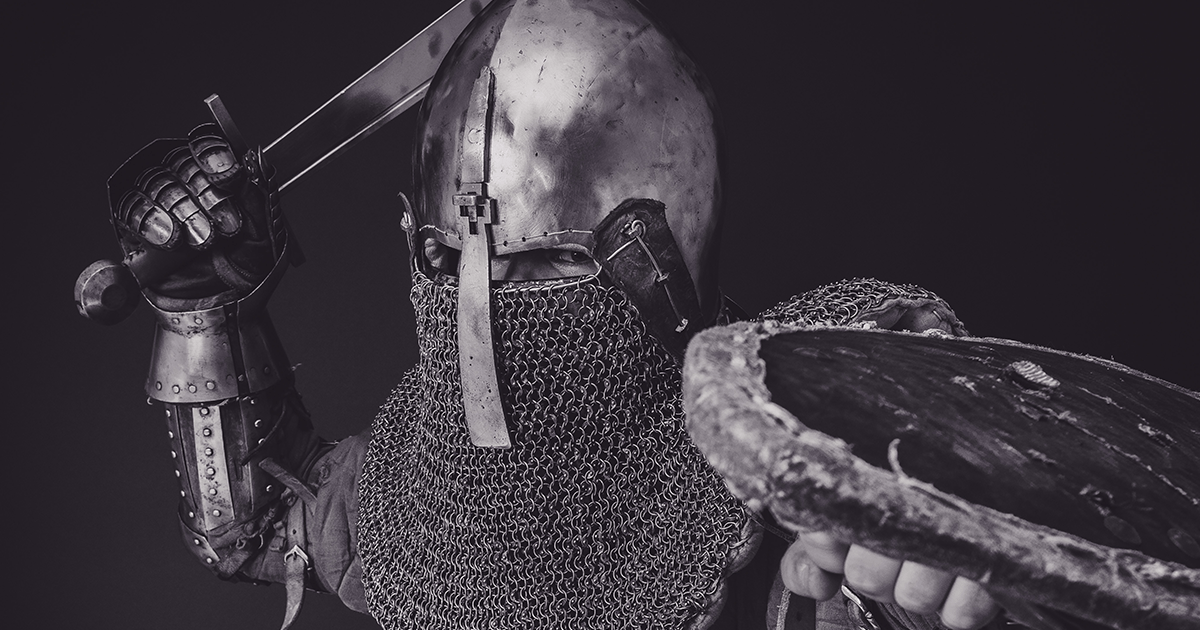
TO WIN, YOU MUST NOT BE DEFEATED
The best generals only go into battles that they know will win. The worst ones just go into battles. A skilled general avoids confrontations where there is the risk of defeat, and this causes him not to be overcome and feared.
The opportunity of victory comes from the enemy’s mistakes. To the victory to be ensured, there are essential rules:
- You must know when to fight and when not to fight.
- You must know how to deal with both inferior and superior forces of your army.
- Your army must have a fighting spirit and discipline.
- You must fight so that you are prepared and your enemy is unprepared.
- You must have military capability and freedom to command your troops without the interference of superiors.
ATTACK ONLY WHEN YOU HAVE THE ADVANTAGE AND ALWAYS AVOID THE ENEMY WHERE HE IS STRONG
Avoid the enemy army when your troop formations are in perfect order or when they have a more advantageous position, such as on a higher ground, for example. Never go into a battle out of anger; The reason you fight is to win something.
Anger is transient, but a destroyed state has no return. Avoid the pitfalls your enemy will try to attract you. Do not lead your army to places where your supplies will not arrive or through unknown lands.
GENERAL AND THE SOVEREIGN CAN NOT CAUSE DEFEAT
An army is commanded by a general, but this one also is controlled by the sovereign. This chain of command can create problems, and you need to understand them. A sovereign can disrupt the army if he gives the wrong orders.
That can be done when he asks troops to advance or retreat when it is impossible. The sovereign can lose wars by neglecting the army or placing officers in inadequate positions. These mistakes undermine the soldiers’ confidence and cause defeat.
Not only the sovereign but also the general can have serious problems. The characteristics of the general that lead an army to defeat are:
- Stubbornness – Which leads to destruction;
- Cowardice – Which leads to capture;
- Distemper – That makes him susceptible to insults;
- Excessive Honor – Which leaves him susceptible to shame;
- Compassion in excess of his men – Which leads to a weak army. He can be reckless and lead his army to destruction, or be a coward and get captured. A general can be proud or uncontrolled and feel teased by provocations from the enemy, or he may be concerned about the comfort of his men and let such considerations prevent military tactics. The general is responsible if any of these calamities happen to an army:
- If he throws his army against a force that is ten times its size, causing his soldiers to flee.
- If your soldiers are too strong compared to their superiors, causing insubordination.
- If the soldiers are too weak, causing them to be worn by officers and defect.
- If the superior officers are rabid and undisciplined, causing them to attack out of their own volition and cause the army’s ruin.
- If the general is weak and undecided, which results in a weak and disorganized army.
- If the general is not able to estimate the strength of the enemy and throws a lower force against a superior, leading to an overwhelming defeat.
STRATEGY AND SPY
A prolonged war can deplete the resources of any state, leaving it weak and vulnerable, after all, maintaining an army is expensive.
We must focus on quick and decisive victories, not long campaigns. In war, you should avoid surrounding walled cities, because this usually takes months of preparation and may slow you down.
To lessen the cost of war, you have to capture a whole, intact state, city, or army instead of destroying it through an expensive battle.
And to achieve this, you need a force much greater than that of your enemy. A great general will subdue his enemies without any struggle, which constitutes the ultimate triumph.
The best armies stand out not only for winning but for winning with ease. Another way to save the resources of your state is to take those of your enemy, taking with you all food, weapons, armor, and men.
That saves the cost of fueling your army and saves your peasants from the workload to maintain their army. Individual battles can end wars, and so you must involve spies: they provide decisive information on the disposition of the enemy.
Spies can also be useful for spreading false rumors and secrets on enemy lines, so reward them well and ensure their loyalty. That is a very low cost to pay if you can save on the expenses of a long war.
Oh, and the last advice from the relentless Sun Tzu: If you plot an attack based on a secret spied by a spy, kill him, as well as any other people to whom he may have told the secret so that this attack will not risk you losing power.
MISLEAD YOUR ENEMY
The art of war is based on the ability to deceive and deter the enemy. You must mask your strength with weakness, courage with timidity, and order with disorder. Confusing your enemy will always leave him unprepared and no match for you.
Make your troops fake clutter when in reality they are highly disciplined. As you approach your enemy, make it seem as though you are far away. When you are ready to attack, make it appear that you are not. Play with your enemy as a cat plays with a mouse.
If he has a difficult temper, irritate him. If he is comfortable, disturb him; If he is well supplied, make him starve; If you are quietly camping, force him to move.
If you want the enemy to advance, have a bait for him; And if you want him to retreat, cause suffering to him. An intelligent combatant takes advantage of the initiative and imposes his will on the behaviour of the enemy army.
Attack him at his vulnerable points, so that he has to run to defend himself. Let your enemy try to guess where you are going to attack, forcing him to divide and spread his forces. Getting him to prepare for attacks on multiple fronts creates chaos and ensures that you always have an advantage.
KNOW YOUR SOLDIERS AND THE SOLDIERS OF THE ENEMY
The spirit of a soldier has its optimum point in the morning. At noon he starts to get by and at night he only thinks about returning to the camp. If the soldiers stand on their spears, they are hungry.
If there are confusion and chaos in the camp, the general’s authority is weak. When the soldiers who seek water for the camp begin to drink before returning, they are suffering from thirst.
When they begin to eat their own cattle and act as if they are no longer going back to their tents, know that they are willing to fight to the death.
KNOW THE LAND WHERE YOU FIGHT
A good general knows where to fight and where not to; he knows which orders from his sovereign he must follow and which ones he must disobey.
As water shapes its course according to the ground by which it flows, the good general also has to adapt to the situation, the ground and the disposition of the enemy.
Observe the terrain to take advantage of its natural advantages and avoid its disadvantages.
Never climb mountains, go against the current or move away from your supplies.
Avoid cliffs, enclosed places or bogs where a small troop can destroy an entire army. Watch the enemy and your soldiers as well. Observe, understand the risks and opportunities before starting an attack. Never expose yourself.
DISCIPLINE AND UNCERTAINTY MAKE THE SOLDIER TO FIGHT UNTIL DEATH
Controlling a large troop is no different from a small one. The important thing is to divide men into smaller groups and use signals such as gongs, drums, and flags to control their forces.
They will move as one, and the cowards will not dare to retreat, and the brave will not advance alone. A great general leads his army as if he were carrying a single man by the hand. Treat your soldiers as children, and they will stand by you until they die.
If you are unable to command them with authority, they will be as useless as spoiled children. An iron discipline among his soldiers is necessary for victory. But for discipline to be effective, your soldiers must admire and respect you.
You must treat them humanely and at the same time keep them under control with discipline and punishment. As a general, you should also keep secrets. Keep your soldiers uninformed and uncertain and change your plans often to keep both your troops and the enemy guessing.
Make long and tortuous routes instead of direct ones. Only reveal your intentions when you are fully immersed in the battlefield.
If the situation sounds good, tell your soldiers about it, but when the situation seems unfavorable, keep that knowledge to yourself. The more you penetrate the enemy state, the more your soldiers will feel part of something bigger.
Put them in unexpected situations where there is no escape, and they will lose all sense of fear and fight with maximum strength, even to the death.
FINAL NOTES
The rules of war do not change, and the good general is always ready for it. Studying war skills, planning properly and knowing how to manage the troop are critical skills for a general.
A qualified general chooses to fight only when he knows victory is inevitable, never to be defeated and always to be feared. Knowing how to cheat your enemy and use territory in your favor are also essential.








